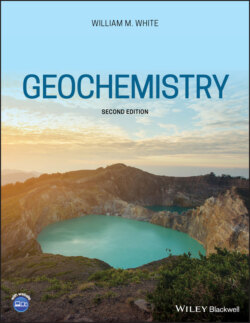Читать книгу Geochemistry - William M. White - Страница 129
3.9.2.1 Le Chatelier's principle
ОглавлениеWe can generalize this principle to the effects of temperature and pressure as well. Recall that:
(2.128)
and
(2.129)
and that systems respond to changes imposed on them by minimizing G. Thus, a system undergoing reaction will respond to an increase in pressure by minimizing volume. Similarly, it will respond to an increase in temperature by maximizing entropy. The reaction ice → water illustrates this. If the pressure is increased on a system containing water and ice, the equilibrium will shift to favor the phase with the least volume, which is water (recall that water is unusual in that the liquid has a smaller molar volume than the solid). If the temperature of that system is increased, the phase with the greatest molar entropy is favored, which is also water.
Another way of looking at the effect of temperature is to recall that:
Combining this with eqn. 2.129, we can see that if a reaction A + B → C + D generates heat, then increasing the temperature will retard formation of the products, that is, the reactants will be favored.
A general statement that encompasses both the law of mass action and the effects we have just discussed is then:
When perturbed, a system reacts to minimize the effect of the perturbation.
This is known as Le Chatelier's principle.
